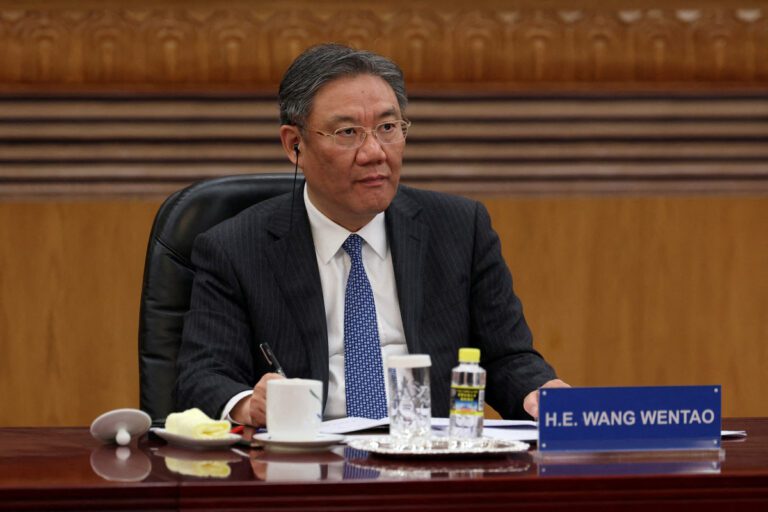🎧 Listen to This Article
Amid escalating tariffs, China seeks to bolster economic cooperation with Saudi Arabia and South Africa, eyeing collective strategies for countering US trade measures.
China’s Strategic Diplomacy to Tackle US Tariffs
In a move signaling a strategic diplomatic effort to mitigate the effects of rising US tariffs, China’s Commerce Minister Wang Wentao engaged in separate video calls with his counterparts from Saudi Arabia and South Africa on Thursday, April 10, 2025. During these discussions, the focus was on reinforcing bilateral trade ties and exploring coordinated responses to the United States’ recent tariff actions, which have been increasingly aimed at China.
The Chinese Ministry of Commerce’s statements indicated that the meetings centered around expanding economic cooperation, with a particular emphasis on trade relations with both Saudi Arabia and South Africa. Wang Wentao also discussed the roles that the Gulf Cooperation Council (GCC) and international bodies like the G20 and BRICS could play in addressing the trade tensions stemming from the US’s imposition of higher tariffs on Chinese goods.
While the details of the discussions were not fully disclosed, it is clear that China is seeking to solidify its global trade partnerships as the US escalates its tariffs on Chinese imports. These talks represent part of China’s broader strategy of engaging with key international players to find common ground and foster unity in counteracting what Beijing perceives as unfair trade practices by the US.
Strengthening Alliances with Saudi Arabia and South Africa
The conversation with Saudi Arabia’s Commerce Minister, Majid bin Abdullah al-Qasabi, was focused on enhancing the trade dynamics between the two nations, particularly within the context of the GCC. The GCC, a political and economic union comprising Saudi Arabia, the United Arab Emirates, Qatar, Kuwait, Oman, and Bahrain, has increasingly been viewed as an important platform for China to advance its trade interests, especially as the region’s energy exports continue to play a vital role in global markets.
On the other hand, China’s discussion with South Africa’s Parks Tau also highlighted cooperation within the frameworks of larger international organizations. South Africa, as a leading member of BRICS (Brazil, Russia, India, China, and South Africa), holds significant strategic weight in these conversations, as the group has historically opposed protectionist trade policies and advocated for more open international trade. South Africa’s participation in these dialogues underscores China’s push for stronger multilateral responses to the growing trade protectionism from the US.
The Impact of US Tariffs on China
The ongoing tariff dispute with the United States, which began under former President Donald Trump, has escalated sharply in recent weeks. Trump recently paused reciprocal tariffs against several nations but ramped up duties on Chinese goods as a direct response to China’s retaliatory actions. According to a White House official, the US has now imposed tariffs of up to 145% on Chinese imports since Trump took office, marking a significant escalation in trade tensions between the two economic giants.
Despite this, Trump has indicated that he remains optimistic about the potential for a deal with China, expressing confidence that the two nations can eventually reach an agreement that benefits both sides. Trump reiterated his longstanding claim that China has “taken advantage” of the United States in the past, fueling the current tariff measures.
While the US president remains hopeful for a resolution, Chinese officials are actively exploring alternatives to mitigate the economic impact of these tariffs, particularly by strengthening alliances with key trading partners like Saudi Arabia and South Africa. These efforts signal China’s determination to diversify its trade relationships and reduce its reliance on the US market in the face of increasing trade barriers.
Global Repercussions and Strategic Alliances
China’s diplomatic push to align with Saudi Arabia, South Africa, and other global partners is a clear indication that the trade conflict with the US could have long-lasting implications not only for Sino-American relations but for global trade dynamics as well. By reinforcing its economic ties with the Gulf countries and BRICS members, China aims to create a more resilient trade network capable of withstanding the pressures of protectionist policies.
As trade tensions continue to mount, it remains to be seen whether these efforts will result in a more unified and robust international stance against US tariffs, or if the global economic landscape will continue to be shaped by bilateral disputes and the increasing fragmentation of global trade systems.
For further details, clarification, contributions, or any concerns regarding this article, please contact us at editorial@tax.news. We value your feedback and are committed to providing accurate and timely information. Please note that our privacy policy will handle all inquiries



